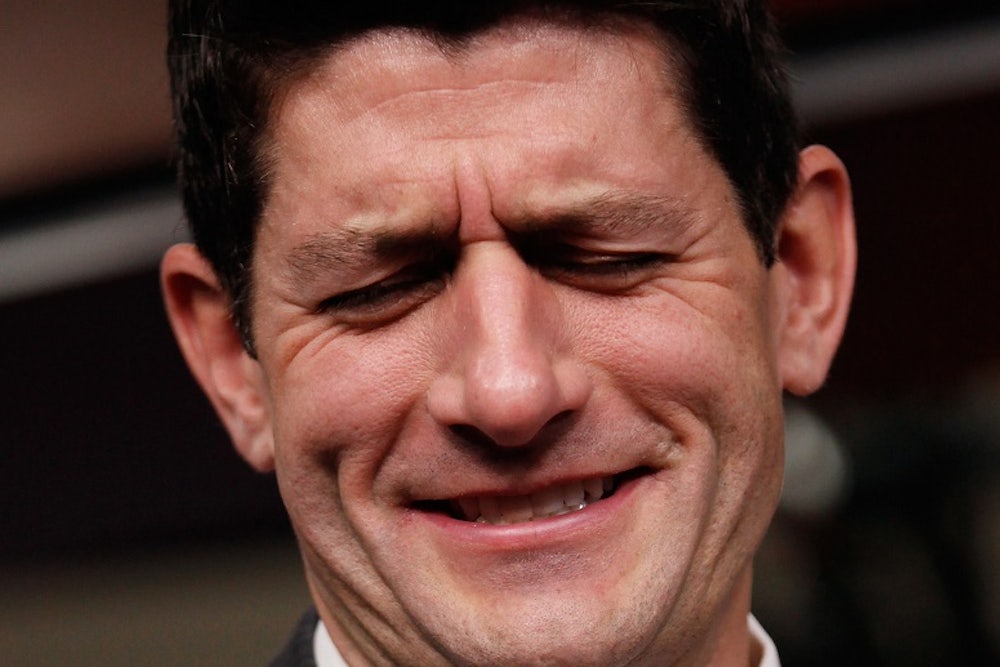When Mitt Romney chose Representative Paul Ryan as his running mate in the 2012 presidential election, the tea party was ecstatic. "It's a big step toward what the tea party has been trying to accomplish," Matt Kibbe, the president and CEO of FreedomWorks, said at the time. "It gives people a reason to be more enthusiastic about the Republican ticket." But just two years later, Kibbe and his fellow tea party activists are singing a different tune: Ryan has betrayed the movement.
The first significant break between Ryan and the tea party came at the beginning of this year, when he collaborated with Senator Patty Murray, the Democratic chair of the Senate Budget Committee, on a budget that avoided another government shutdown. That deal replaced $65 billion of the sequester over the next two years by requiring federal workers to contribute more to their pensions, implementing new fees on airline tickets, and cutting spending a decade from now. While the deal actually reduced the deficit by $20 billion in total, the far right was furious. “It is disappointing to see Chairman Ryan forget lessons learned this past spring, when House Republicans united to win reasonable spending limits in the face of President Obama’s hysterical predictions that even modest cuts would harm our nation,” said Tim Phillips, the president of American for Prosperity. Erik Erickson, of Red State, wrote “Bend over America, here it comes.”
If Ryan hoped to recover any good will with his famous budget—the one he releases each year as head of the House Budget Committee—those hopes were quickly dashed. Sarah Palin called it “a joke” and other tea party leaders criticized it for insufficiently cutting spending. Those comments are tough to square with the previous praise tea party leaders have heaped on Ryan. The “Path to Prosperity” is one of the main reasons that they were thrilled with Romney’s selection of Ryan as his running mate, and the 2014 Ryan Budget is just as conservative as in the past. (Only in this version and the FY 2014 one was Ryan able to balance the budget in ten years.)
Things have only grown worse since then. In July, Ryan confirmed their suspicions when he announced a new deficit-neutral antipoverty program. In doing so, he effectively disowned his budget, which proposes huge cuts to programs for low-income Americans. Tea party groups have yet to weigh in on Ryan’s proposal, but it’s hard to see how they’d approve. If the spending cuts in Ryan’s 2015 budget were too small, then his antipoverty agenda, which doesn’t cut welfare spending at all, won’t be acceptable.
This past week, Ryan has hit the media circuit to publicize his new memoir, The Way Forward, in which he puts more distance between himself and the tea party. He has eschewed the phrase “makers and takers” and even rejected his previous analogy of the social safety net as a “hammock” that “lulls able-bodied people to lives of dependency and complacency.” Ryan’s repudiation of these phrases will be seen as yet another dismissal of the tea party worldview.
The final straw may have been his description of the government shutdown. In The Way Forward, Ryan calls that political strategy a “suicide mission.” As Sam Stein and Arthur Delaney write in the Huffington Post, Ryan’s account whitewashes his actual role in the shutdown. He was more supportive of it than he admits. But the message is clear: The tea party’s strategy hurt the Republican Party and should not be repeated. This has not gone over well on the right. In Politico Magazine, Scottie Nell Hughes, the news director of the Tea Party News Network, writes, “[W]e of the grassroots GOP are in no mood to hear that our push for defunding Obamacare and using the debt ceiling to force President Obama to curb reckless spending had all the wisdom of a Japanese kamikaze.”
“If Paul Ryan does not have enough tact to forgo insulting the conservatives within his own party,” she added, “then I have serious doubts he has the wisdom and judgment needed to lead the GOP to victory in 2016.”
Ryan’s fall from grace on the right is emblematic of his transition from ideologue to practical policymaker. In the process, Ryan has received a better reception on the left. At The Week, writer Ryan Cooper called it a “marked improvement from his previous efforts.” But this transformation is not without its costs: Ryan is no longer the tea party golden boy.
“I'm very disappointed in Paul Ryan,” Judson Phillips, the founder of the Tea Party Nation, writes in an email. “He has a raging case of Potomac Fever and his only goal now seems to be embracing John Boehner's freshly laundered white flag of surrender.”
Ryan has not yet alienated his more conservative colleagues in Congress. And many activists, particularly those less attentive to the daily happenings in Washington, may not have even noticed his betrayal. But repeatedly this year, Ryan’s actions have made it clear that he is distancing himself from the tea party. It's no longer a matter of if the full movement will turn on him. It's a matter of when.
A previous version of this piece said that the Ryan Budget balanced for the first time in FY 2015. It balanced in FY 2014 as well.
